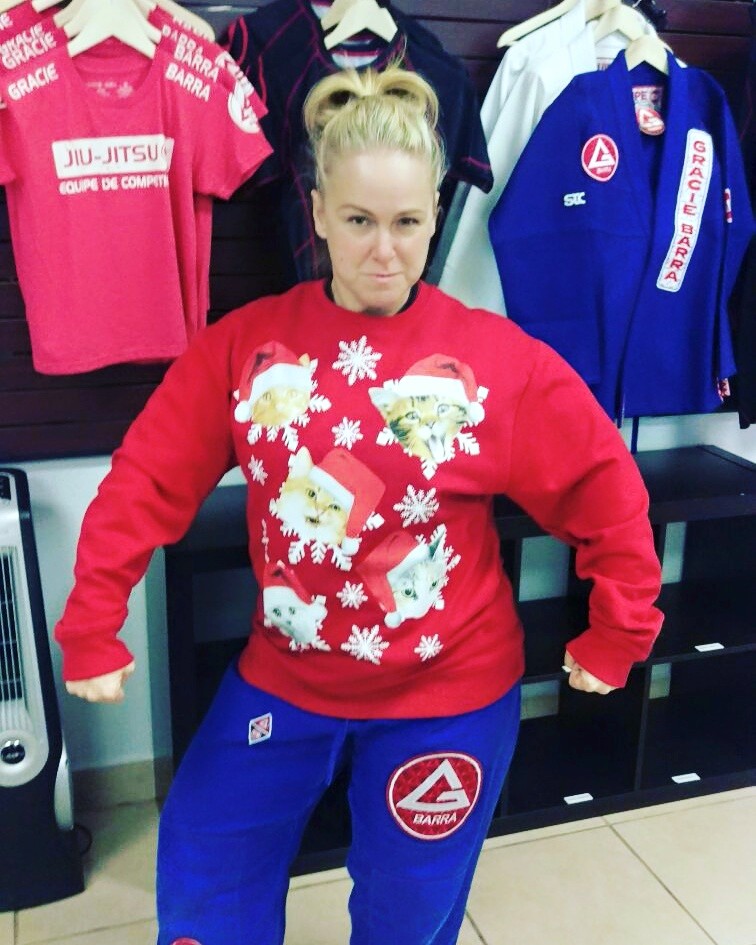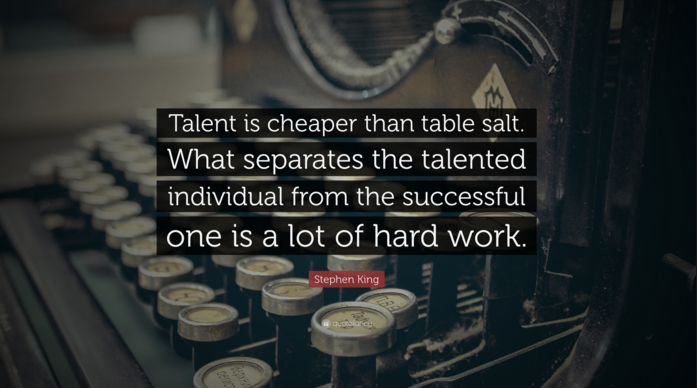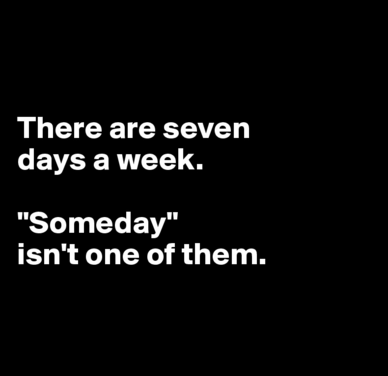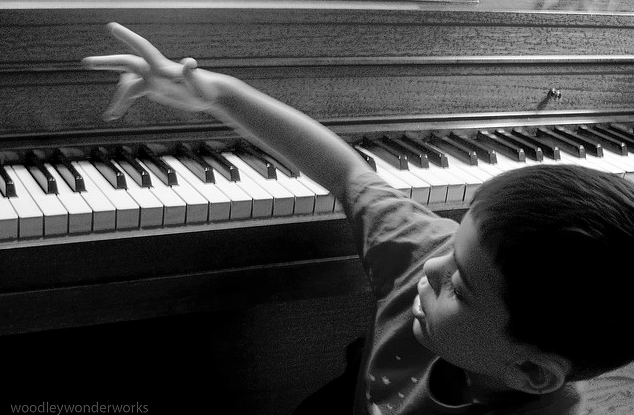
Mastery is peculiar in that spectators see whatever the professional does as ‘easy.’ From starting then running a successful business, to playing guitar to writing brilliant screenplays, masters rarely seem to even break a sweat.
Same with authors. With the pros? Their stories flow, drag readers in like an unseen riptide only to release the exhausted and elated audience at The End.
Mastery, to the casual observer, appears seamless and effortless.
Everyone Begins Somewhere
I’d like to offer a glimpse of what the journey from Noob to Master is really like so you can set expectations accordingly. This will keep you pressing, and from being too hard on yourself. First and foremost, it’s vital to relax a little and give yourself permission to be new.
Many of us decided to become writers because we grew up loving books. Because good storytellers are masters of what they do, it’s easy to fall into a misguided notion that ‘writing is easy,’ which explains the mountains of crappy ‘published novels’.
It also explains why non-writers can so easily dismiss what we do. As if the only thing keeping them from turning out the next Game of Thrones is ‘finding the time’ and not a matter of a crap ton of training and work.
Granted there are a rare few exceptions—the born ‘genius’—but most of us will go through three acts (stages) to attain mastery in this career…if we stick it through.
Act One—The Newbie
This is when we are brand new. We’ve never read a craft book and the words flow. We never run out of words to put on a page because we are like a kid banging away on a piano having fun and making up ‘music.’ We aren’t held back or hindered by any structure or rules and we have amazing energy and passion.
But then we go to our first critique and hear words like ‘POV’ and ‘narrative structure.’ Critique members return samples of our opus hemorrhaging red ink. It’s in this moment, we learn maybe we’ve not yet achieved mastery.
In fact maybe, just maybe we’ll see we don’t know as much as we think we do. Also *winces* we might become aware we are not so ‘naturally gifted’ that we get to skip all the training and the hard stuff.
This is writing, not Six Flags. There are no instant passes to the front of the line.
It’s during this period we might also grow keenly aware of why so many famous authors drank…a lot. Or went crazy.
Act Two—The Apprentice

The Apprentice Phase comes next. This is where we might read craft books, take classes, go to conferences and listen to lectures. During the early parts of this phase, books likely will no longer be fun. Neither will movies. In fact, expect most of your family to ban you from ‘Movie Night.’ Everything now becomes part of mastery training. We no longer look at stories the same way.
The Apprentice Phase is tough, and for many of us, it takes the all the fun out of writing. The Apprentice Phase is our Act II. It’s the looooongest, but filled with the most growth and change.
It’s the span of suck before the breakthrough.
There is a darn good reason WHY not everyone can do what WE DO.
Writing is TOUGH
Many new writers will shy away from craft books because they fear ‘rules’ will ruin their creativity. Truth is? They will totally ruin our creativity, but only for a little while 😉 . It isn’t permanent.
Eventually we realize that rules were made to be broken. BUT, the difference between the artist and the hack is that the artist knows the rules and thus HOW to break them and WHY and WHEN. We start to see rules as tools.
Some of you may know I practiced Brazilian Jiu Jitsu for years. One thing we did to improve our skills was to grapple blindfolded. The trick was to not get fixated visually, but to be able to feel what our opponent was up to, where he was headed and move like water. By being relaxed, it made it next to impossible for an opponent to sink in the hold, choke, arm bar, whatever.
Wherever our opponent was headed, we were already two steps ahead by FEEL. THAT is how sensitive you want to become in Jiu Jitsu…and in writing.

We want to become so immersed that we can do this stuff blindfolded. We instinctively feel what needs to happen where without having to say ‘Oh, this is a scene, and this is a sequel.’
As we move through the Apprentice Phase and we train ourselves to execute all these moves together—POV, structure, conflict, tension, setting, description, dialogue, plot arc, character arc—it eventually becomes easier. In fact, a good sign we are at the latter part of the Apprentice Phase is when the rules become so ingrained we rarely think about them.
We simply write.
Mastery Has a ‘Feel’

We’ve read so much fiction, watched (and studied) so many movies, read so many craft books, heard so many lectures, and practiced so much writing that all the ‘rules’ are now becoming instinct and, by feel, we are starting to know where and how to bend, break or ignore them.
Like anything, there is NO substitute for DOING. Watching Holly Holmes videos is a good idea for understanding ground-fighting, but it can’t take the place of mat time. Reading, taking classes, studying cannot replace writing crap until we don’t write crap.
At the end of the Apprentice Phase, writing is now starting to become fun again, much like it was in the beginning when we were banging away on the piano keyboard. Like the fighter who instinctively knows to arm bar an opponent without conscious thought, we now find more and more of the ‘right’ words and timing without bursting brain cells.
The trick is sticking it through the Apprentice Phase long enough to engrain the fundamentals into the subconscious. This is how we get ever closer to mastery.
Master

This is where we all want to be. We all want this on Day One, but sadly, I believe this Day One Master is reserved for only a handful of literary savants. Mastery is when we return to that childlike beginning. We write with abandon and joy and, since the elements of fiction are now part of our DNA, our literary marrow, what we produce isn’t the off-key clanging of a neophyte. It’s actually a real story worth reading.
Granted, it isn’t all kittens and rainbows. Masters have a lot of pressure to be perpetual geniuses.
I believe most of us, if we stick to this long enough, will always be vacillating between the Advanced Apprentice Phase (Journeyman) and the Mastery Phase. If we choose to try a totally new genre, we might even be back to Newbie (though this will pass more quickly than the first time).
We have to to keep growing. The best writers still pick up craft books, refresh themselves in certain areas, read other authors they enjoy and admire to see if they can grow in some new area. Masters seek to always add new and fresh elements to the fiction.
Simple Steps to Mastery

1. Embrace the Day of Small Beginnings—Starting is often the hardest part. Enjoy being new. Enjoy that feeling because you will reconnect with it later because you’ll recognize it.
2. Understand We All Have an Apprentice Phase—We will all be Early, Intermediate, then Advanced Apprentices. How quickly we move through these will be dictated by dedication, hard work and, to a degree, natural talent.
3. No One Begins as a Master and Few Remain Permanent Masters—Every NYTBSA was once a newbie. When we understand this career has a process, it’s easier to lighten up and give ourselves permission to be imperfect, to not know everything. Many writers get discouraged and give up too soon because they don’t understand there is a process, and they believe they should be ‘Masters’ right away.
Hey, I did.
We need to give ourselves permission to grow. If we love and respect our craft, we will always be learning, so we will continue to dip back into ‘Apprentice’ to refine our art even further. We might read older works of literature, explore other genres, write a genre we never cared for to test ourselves.
What Are Your Thoughts?
Does this make you feel better to know this career has a process? Are you in the Act II span of suck and getting weary? It is okay, REALLY! It’s natural. What are you doing to remain focused? Which part has you the most discouraged? Write with the abandon of the Newbie then edit with the eyes of an Advanced Apprentice or Master 😉 .
I love hearing from you and am not above bribery!
What do you WIN? For the month of DECEMBER, for everyone who leaves a comment, I will put your name in a hat. If you comment and link back to my blog on your blog, you get your name in the hat twice. What do you win? The unvarnished truth from yours truly. I will pick a winner once a month and it will be a critique of the first 20 pages of your novel, or your query letter, or your synopsis (5 pages or less).
***Jorge Kafkazar is the winner for November. Please send 5000 words in a WORD doc to kristen at wana intl dot com. Double-spaced, 12 point NTR font, one-inch margins.
I’m running Round Four of my ‘Write Stuff’ Special. 20 pages of deep edit for $40. Only 10 slots were available, and ONLY ONE LEFT. Get that last slot HERE.
ALSO, NEW CLASS! 20% Early Bird Discount
The Art of Character: How to Craft Dimensional ‘People’ in Fiction
 Instructor: Kristen Lamb
Instructor: Kristen Lamb
Price: $45 USD (Only $36 with discount)
Where: W.A.N.A. Digital Classroom
When: January 4th, 2018 7:00 P.M. EST—9:00 P.M. EST
No matter what genre we write, the key to writing unforgettable stories always rests with character. How do we create intriguing characters who hook readers and never let them go? What makes a character unforgettable? How do we write stories that endure?
It is easy to fall into tropes and caricatures if we lack a fundamental understanding of human nature and how this plays out in the dramatic narrative. This class will delve into how to add depth to our characters which will, in turn add, resonance with our plot.
This class will cover:
- Discovering Wounds;
- Understanding Coping Mechanisms;
- How Wounds Collide to Increase Dramatic Tension
- How to Create Dimensional Characters
- Using Character to Plot
***A FREE recording is included with purchase.









29 comments
7 pings
Skip to comment form
It sucks being a newbie. A lot.
And you’re right, we all want to be masters. It’s one of the reasons every time I see a movie with a montage and get grumpy. All the work, all the sacrifice, all the perseverance, reduced to a 30 second clip.
I wonder if we ever really feel we’re at Step 3. I have 4 books out and I still feel like I’m still trying to master the written word.
And I’m helping a noob get her stuff polished. My 16 year old granddaughter is finishing edits (again, this is stage six or seven…) on her first book and writing on the second. I promised her that we would publish if she worked on it and got it into shape. She also signed up for a Creative Writing class in high school. And she’s way ahead of her peers in understanding editing is essential and keeping the story in either the past or the future tense is necessary (she was all over the place in the first draft).
So, I’m learning as I teach her and work with her edits. It’s fun. I may, eventually, get to that 3rd stage…
Michelangelo said, “If people knew how hard I work, they wouldn’t think I was so great.” And he was a master.
Okay, now I have to finish reading Kristen’s post!
Excellent article Kristen. I see way too many authors give up at the apprentice level. I am all for hanging in there and learning more. I write in four genres, but I would love to add Thrillers or Streampunk to the mix of Fantasy, Paranormal, Scifi and Memoirs. Keep up the good work. I love your posts and find them very insightful.
Another inspirational post. As a ghostwriter of my dead husband’s stories, I never knew how hard it was to write … until I started. I’ve learned so much but am not even close to being a Master, if ever. It’s heartening to know there is a process, and time and dedication will pay off. Thank you. 🙂
Sahara –
First, I am so sorry for your loss. Working on his manuscripts keeps him closer than one could imagine.
But, I know that feeling! Without ANY experience on my part, some guy asked me to ghostwrite his novel. Say WHAT? For a hundred bucks. I cracked up, first … ’cause I am not a ghostwriter. Second, because it was an ‘idea,’ a guy on a hover board in the future, trying to save the world. UM. That’s been done, like over and over and over. Third, he only wants it ‘for himself, to hang like a picture.’ UM. And four, I asked him what he read. ‘Nothing, ’cause I don’t want it to color my writing talent.’ Wait. What? He wants a ghostwriter (and me? Serious? I do not bill myself as such)to accept a hundred bucks to completely write a story based on ‘Back to the Future,’ for someone who watches 1980 movies and won’t read a fiction in his genre.
If your husband had great, original ideas, a good plot, organized in a fashion that you can edit (which is a job in itself) and fill in the spaces, rewrite, then you are ahead of the game. It’s quite the process to learn and it is a sharp learning curve. Do NOT ask your friends if they like it. They will gush and lie through their teeth to keep you as a friend. Same with family. Find a tough critique group and rewrite. Over and again. Just remember, ghostwriting is about a (low end) $15,000 project (for a pro) — I had to look it up, meaning for you, that would be a windfall if they sell (and again, that’s both high and low depending on a zillion factors).
I know you can do it, and you will be elated for his success and your hard work. Blessings
-c
Hi Claire,
Thanks for your wonderful words of encouragement. My husband did have very original plots/stories which I loved when he wrote them in the late 80’s.I always felt they needed to be published, plus it kept him close and me focused on something else than my loss. I can’t imagine even trying to write without being a reader first.
Thanks for this good encouragement today! I forget sometimes that the apprentice stage does take so long. Years, even. The faster we can get through those first 10k hours of training, the better it is. I’m reminded of the story of the pottery teacher. (Not sure how true it is, but it goes like this:)
A pottery teacher divided their class into halves. To side A, they told them that they grade would be determined by each person throwing the single most perfect pot possible. Side B would be graded on the sheer quantity of pots they could produce. At the end of the class, the pots produced by side B were better made than the single pot produced by side A. Because practice.
This reminds me of when my dad taught me how to drive. I was 14 and all I wanted was to jump in a zoom off. I had already driven the tractor. It was time to go wild. I thought the lessons would be with our auto-tranny car, but nope. Dad showed up with a stick shift he borrowed from some pal. He claimed that I needed to learn how to drive a ‘real’ car, and then I would be ‘ready’ for an auto-shift cruiser.
I started writing in grade school, had my first short story published as 15. I had the tractor driving dooowwwwn! I was lucky to receive strong support from high school teachers, but I was just ‘gut writing’. Instinctive stuff that seemed to please.
Then my dad, a Harvard business prof, started giving me case studies to write, the same that he assigned to his business classes. I spent a year in tears, learning to write a good synopsis, frame arguments, and dissect a business using certain logic tools. I hated it! But…I learned how to use 8 words to create the mood, understanding, emotion I wanted, instead of 18 or 28.
This was an exceptional post, Kristen — I love all your stuff, but this one really strikes some chord…maybe it’s just me, eh?
Thanks for sharing your thoughts, as always…
Hi Kristen
great post! I needed this like oh say, 6 years ago because I wrote with abandon and thought the manuscript was ready. Doink. I cannot tell you how many rewriting/editing/rewriting/editing etc etc stages I’ve gone through on novel one. I still have not reached ‘master’ and am a long ways away, like Kessie says: years. But I feel better. I’ve critiqued, reviewed, and even reviewed and critiqued well-known authors… sigh. But, having finished one, sending it off, I figured, hey PLOTTING instead of pantsing is a great idea. Well, yes and no. It was and still is stilted. My ‘process’ has (one hopes)improved… Everyone has a different process yet the stages remain the same. Carving out hours to write can be simple, especially at the beginning (at least for me). But it is tough, tough work – especially the editing part…
Family indeed, abandons us to the insane group of sheep. Especially during nanowrimo…
When I printed up novel 2, I looked at it and thought … no, no, no! what a horrible idea. After a few days of ignoring it I picked it up and began the ugly process of reading as a reader would do. With a pen. And sober. Tearful.
But it’s worth it. One, because my obsession is fulfilled. And two, because my husband asked me what I was ‘working on.’ I said… ‘editing and rewriting my book.’ With the alacrity of a bus falling off a cliff, he said … ‘I didn’t know how much work was involved.’ Ha. It’s super important (I love how literary I can be at times…) to read other works especially by the masters. To paraphrase someone famous – S. King I think: ‘if you’re not reading, don’t bother writing.’
and yes… Strunk and White does come in handy, as much as I despise that book. Conferences, webinars, books, critique groups are fantastic resources.
Finally my words to the non-writers are: Go ahead, please. If you think it’s that simple, and you want my book ‘for free’ despite the bazillion years I’ve worked on it … please. Write a novel. tee hee.
-c
It is tough being the newbie-becoming-apprentice. But rewarding.
I started with a dystopian sci-fi (self-published), then wrote an historic fiction (in test phase before publishing), and now working on a sequel to the first book. Later I plan on writing a romance novel, which will be waaaaay outside of my comfortable happy place.
Timely post. I am learning all I can and it is easy to be overwhelmed by how far I have to go. Helpful to see the big picture.
I think I may be lost somewhere in the soggy middle of Act II: Apprentice. But maybe it just feels like that because I’m publishing a book for the first time (myself) and the learning curve is so steep I’m scared to look down.
By the by, I’m pretty sure that Shakespeare quote isn’t from Shakespeare. I’ve also heard it attributed to Swami Vivekananda, but I haven’t seen any hard evidence for that, either.
Great post. I know personally I have always been obsessed with becoming a master of something. The title in itself symbolizes years of hard work and discipline. A commitment to excellence that few others will never even attempt let alone achieve. Then I look at my work and realize I’ll probably be a newbie forever!
I feel as if I will always be an Apprentice, but these days I’m enjoying the ride a heck of a lot more than I used to!
I’m enjoying the apprentice phase, long and drawn-out as it is. Writing is starting to become enjoyable again, so hopefully that means I’m making progress.
I am so excited to be in the Noob stage where the words are just coming. I can’t wait to finish my first draft of my first novel! I would be lying if I said I wasn’t a bit intimidated for the next phase. But I am determined to succeed. Your article is very inspiring! Thank you for this.
Yes, the information was very helpful! Thanks.
nice one
Great outline of a plot where we, the apprentice authors, happen to be the heros!
Some days I feel like all three… I have become interested in books on craft, specifically figurative writing and descriptive phrases that won’t overwhelm my readers. Do you have any recommendations?
Author
Study novels you enjoy because likely your voice will be similar and study them. That is what musicians do. They study the pieces they love, then outside stuff then marry it all together eventually for a style uniquely their own.
Many new writers will shy away from craft books because they fear ‘rules’ will ruin their creativity. Truth is? They will totally ruin our creativity, but only for a little while ? . It isn’t permanent
I believe this passage of yours is an eye-opener.
The only way out is through. Indeed it is.
Yet when we are still learning, we feel bogged down by dozens of rules and principles, and it is easy to forget even the most basic truths… I think this is why I go running a lot. In this way I can vent my frustration in a way that prevents me from tearing my works in progress into pieces. =)
Author
Give yourself permission to be LEARNING. It’s okay. One day you’ll look back and actually SEE the glimmers of genius even in new and “horrible” work. Trust the process. ((HUGS))
It’s always interesting how everyone wants to be a Master, but many writers won’t admit when they reach that phase for fear of looking arrogant!
You’re so right about how it felt to be a newbie. So joyful! Ah, the bliss! I remember how I’d laugh out loud at part of my story. It was a blast. Then I learned that I had to have a PLOT! Oh, come on, why do I have to have a plot? Why can’t I just write a bunch of funny scenes? Louis Sachar’s Wayside School stories didn’t have a plot, and my children and I loved his books.
The beginning apprentice stage was painful. There weren’t many craft books at my library. This was before I had access to the internet. I signed up for “Children’s Literature” at the community college. I loved every minute of it, but the teacher wasn’t up for being pestered by a newbie. I was alone and discouraged, but then I met other writers and eventually found a critique group and learned about SCBWI, Society of Children’s Book Writers and Illustrators. They offered all kinds of workshops and held conferences. If that teacher had only told me about SCBWI, I wouldn’t have been such a pest. I would have found what I needed.
New writers nowadays are blessed to have all the help they need at their fingertips. There’s so much information out there now, it’s overwhelming. But awesome when we find blogs like yours and information we need for our research. Very cool to be a writer nowadays.
I love your Jiu Jitsu analogy. To write blindfolded and be able to “feel” what my story needs, yes, that’s a wonderful goal to strive for.
This is one of my favorites of all your blog posts. Definitely resonates with me. I can totally relate to these stages. Mastery is no longer an impossible goal. I can “feel” it and “taste” the reality of it as I continue on this fantastic adventure.
Thanks for the trip down Memory Lane. This was fun.
I train in martial arts too – this is the perfect analogy!! Tests are much like critique and are now we learn…they are also terrifying!! Thank you for helping me see this relationship!
Great post and so accurate!
I sometimes use studying to jump-start me when I’m struggling with the next words. I have a ton of saved articles with intriguing titles, such as “9 Ingredients of Character Development” which I’ve read at least three times, but will still make me look at my characters and consider how I could make them better. Reading about the craft can make you take a new look at your work and improve it, but it can also get you refocused to keep going.
Also, watched Kong, Skull Island (or whatever it was called) over the weekend with the man. Not my usual type of movie but while he was enjoying the action scenes, I was critiquing.
“They sacrificed understanding Kong’s motivations and character interaction for giant spiders and lot’s of explosions that diluted the message in the original movie and will look outdated in two years.”
I kept that tidbit to myself rather than risk being banned. 🙂
But I also have to say that writing IS easy. It’s editing, revising, restructuring, cutting, polishing, querying, sending it out into the world, and the business side of what comes after (if you’re lucky) that’s hard! lol.
Hola. Thank you for writing. I loved this post, in more ways than I can easily explain. I’m behind on blog reading – in reading in general.
Just curious, Devil’s Dance is unavailable at Amazon. I apologize if you’ve already talked about this, but is something up with that novel. I began to write about it, but if it’s not available maybe now isn’t a good time.
[…] writers. If you aren’t following her blog, you’ve been missing out, so here’s her link. She also offers awesome classes for writers, and be sure to check out her archives if you love […]
[…] Kristen Lamb for […]
[…] https://authorkristenlamb.com/2017/12/writingtomastery/ […]
[…] https://authorkristenlamb.com/2017/12/writingtomastery/ Where are you in the journey? I think I’m at the journeyman stage. I’m processing everything I’ve learned the past years and it’s all coming together like it should. […]
[…] The Writers’ Journey: Newbie to Mastery […]
[…] Lamb reflects on the writers’ journey: newbie to mastery, while Aimie K. Runyan promotes self-care for the newly launched […]
[…] The Writers’ Journey: Newbie to Mastery […]